Intro
Discover the uses and benefits of Famotidine, a heartburn medication, for acid reflux, peptic ulcers, and gastroesophageal reflux disease (GERD) treatment, offering relief and prevention.
The world of medication is vast and complex, with numerous drugs available to treat a wide range of conditions. One such medication is famotidine, a histamine-2 (H2) blocker that has been widely used for several decades. Famotidine is known for its effectiveness in treating various gastrointestinal issues, and its uses and benefits extend beyond just relieving heartburn and acid reflux. In this article, we will delve into the world of famotidine, exploring its uses, benefits, and mechanisms of action.
Famotidine is a type of antacid that works by reducing the amount of stomach acid produced by the body. This makes it an ideal treatment for conditions such as gastroesophageal reflux disease (GERD), peptic ulcers, and Zollinger-Ellison syndrome. The medication is available in various forms, including tablets, capsules, and injectable solutions, making it accessible to a wide range of patients. With its proven track record of safety and efficacy, famotidine has become a staple in the treatment of gastrointestinal disorders.
The importance of famotidine cannot be overstated, as it has revolutionized the way we approach the treatment of acid-related disorders. By reducing stomach acid production, famotidine helps to alleviate symptoms such as heartburn, bloating, and abdominal pain. This, in turn, can significantly improve the quality of life for individuals suffering from these conditions. Moreover, famotidine has been shown to be effective in preventing complications associated with prolonged acid reflux, such as esophageal damage and narrowing of the esophagus.
Famotidine Mechanism of Action
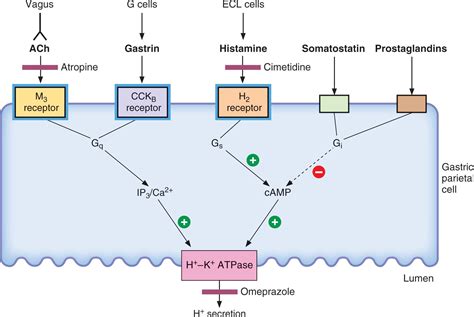
Famotidine works by binding to H2 receptors in the stomach, which are responsible for stimulating the production of stomach acid. By blocking these receptors, famotidine reduces the amount of acid produced, thereby alleviating symptoms associated with excess acid. This mechanism of action is specific to H2 receptors, making famotidine a targeted and effective treatment for acid-related disorders. The medication is quickly absorbed into the bloodstream, allowing it to rapidly take effect and provide relief from symptoms.
Famotidine Uses
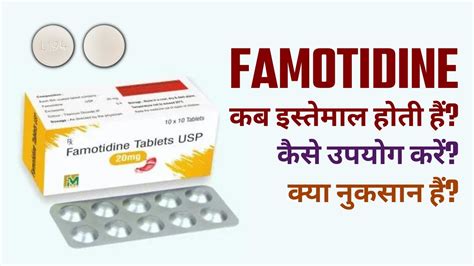
Famotidine is primarily used to treat conditions characterized by excess stomach acid production. Some of the most common uses of famotidine include:
- Gastroesophageal reflux disease (GERD): Famotidine helps to reduce symptoms of acid reflux, such as heartburn and regurgitation.
- Peptic ulcers: The medication promotes healing of ulcers by reducing stomach acid production.
- Zollinger-Ellison syndrome: Famotidine is used to treat this rare condition, which is characterized by excessive stomach acid production.
- Heartburn and acid indigestion: Famotidine provides quick relief from symptoms of heartburn and acid indigestion.
Famotidine Dosage and Administration
The dosage and administration of famotidine vary depending on the condition being treated and the patient's response to the medication. Typically, the recommended dosage is 20-40 mg per day, taken orally or intravenously. It is essential to follow the prescribed dosage and administration instructions to ensure the safe and effective use of famotidine.Famotidine Benefits

The benefits of famotidine are numerous and well-documented. Some of the most significant advantages of using famotidine include:
- Rapid relief from symptoms: Famotidine quickly takes effect, providing relief from heartburn, bloating, and abdominal pain.
- Effective treatment of acid-related disorders: The medication is highly effective in treating conditions such as GERD, peptic ulcers, and Zollinger-Ellison syndrome.
- Prevention of complications: Famotidine helps to prevent complications associated with prolonged acid reflux, such as esophageal damage and narrowing of the esophagus.
- Improved quality of life: By alleviating symptoms and preventing complications, famotidine can significantly improve the quality of life for individuals suffering from acid-related disorders.
Famotidine Side Effects and Interactions
While famotidine is generally well-tolerated, it can cause side effects in some individuals. Common side effects include headache, dizziness, and diarrhea. The medication can also interact with other drugs, such as antacids and certain antibiotics. It is essential to inform your doctor about any medications you are taking before starting famotidine.Famotidine vs. Other Acid Reducers
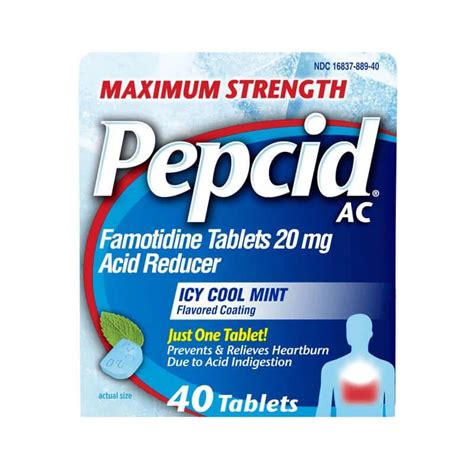
Famotidine is one of several acid reducers available on the market. Other medications, such as ranitidine and omeprazole, also work to reduce stomach acid production. However, famotidine has several advantages over these medications, including:
- Faster onset of action: Famotidine takes effect quickly, providing rapid relief from symptoms.
- Longer duration of action: The medication remains effective for a longer period, reducing the need for frequent dosing.
- Fewer side effects: Famotidine is generally well-tolerated, with fewer side effects compared to other acid reducers.
Famotidine and Pregnancy
Famotidine is classified as a category B medication, meaning that it is generally considered safe for use during pregnancy. However, it is essential to consult with your doctor before taking famotidine if you are pregnant or breastfeeding.Famotidine Overdose and Toxicity
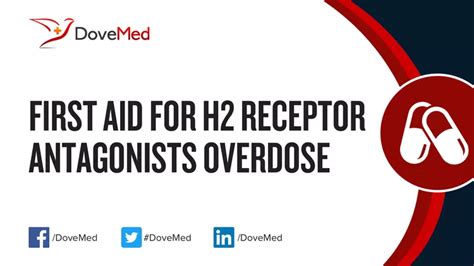
While famotidine is generally safe, overdose and toxicity can occur. Symptoms of overdose include confusion, dizziness, and abdominal pain. If you suspect an overdose, it is essential to seek medical attention immediately.
Famotidine and Liver Disease
Famotidine is metabolized by the liver, and liver disease can affect the medication's efficacy and safety. If you have liver disease, it is essential to consult with your doctor before taking famotidine.Famotidine and Kidney Disease
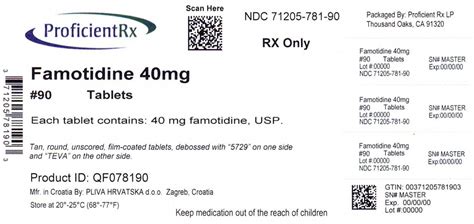
Famotidine is excreted by the kidneys, and kidney disease can affect the medication's efficacy and safety. If you have kidney disease, it is essential to consult with your doctor before taking famotidine.
Famotidine and Drug Interactions
Famotidine can interact with other medications, including antacids, certain antibiotics, and blood thinners. It is essential to inform your doctor about any medications you are taking before starting famotidine.Famotidine and Food Interactions

Famotidine can interact with certain foods, including citrus fruits and tomatoes. These foods can increase the risk of side effects and reduce the medication's efficacy. It is essential to avoid these foods while taking famotidine.
Famotidine and Alternative Therapies
While famotidine is an effective treatment for acid-related disorders, alternative therapies may also be beneficial. These include dietary changes, stress reduction techniques, and herbal supplements. It is essential to consult with your doctor before trying alternative therapies.What is famotidine used for?
+Famotidine is used to treat conditions such as gastroesophageal reflux disease (GERD), peptic ulcers, and Zollinger-Ellison syndrome.
How does famotidine work?
+Famotidine works by binding to H2 receptors in the stomach, reducing the production of stomach acid.
What are the common side effects of famotidine?
+Common side effects of famotidine include headache, dizziness, and diarrhea.
Can I take famotidine with other medications?
+It is essential to inform your doctor about any medications you are taking before starting famotidine, as it can interact with other medications.
Is famotidine safe during pregnancy?
+Famotidine is classified as a category B medication, meaning that it is generally considered safe for use during pregnancy. However, it is essential to consult with your doctor before taking famotidine if you are pregnant or breastfeeding.
In conclusion, famotidine is a highly effective medication for treating acid-related disorders. Its benefits extend beyond just relieving heartburn and acid reflux, as it can also prevent complications and improve the quality of life for individuals suffering from these conditions. By understanding the uses, benefits, and mechanisms of action of famotidine, individuals can make informed decisions about their treatment options. We invite you to share your thoughts and experiences with famotidine in the comments section below. If you have any questions or concerns, please do not hesitate to reach out to us.
